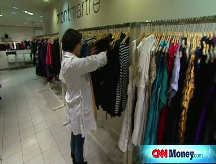From Wal-Mart to the mall, a tough holiday
No. 1 retailer misses forecasts, warns for the quarter. Sears, Macy's among national chain stores that suffered considerably weak holiday sales.
NEW YORK (CNNMoney.com) -- If retailers were hoping for some respite from a protracted slump in monthly sales, it didn't happen in December.
Most of the nation's major chain stores report their monthly same-store sales Thursday. Same-store sales, or sales at stores open at least a year, are an important indicator of a retailer's performance.
The results were clearly disappointing.
Sales tracker Thomson Reuters said December same-store sales for a group of 35 retailers fell 0.9%.That would be weaker than the 0.5% gain logged a year ago, and the second weakest month since the firm started tracking estimates in 2000.
The weakest month was November, when same-store sales fell 2.1%.
The December drop was slightly better than Thomson Reuters' initial forecast of a 1% decline.
Wal-Mart Stores (WMT, Fortune 500), the nation's biggest retailer, reported a 1.7% gain in same-store sales excluding fuel in December. That was less than the 2.8% increase expected by analysts surveyed by Thomson Reuters.
"Wal-Mart softness is concerning due to further cutbacks in discretionary spending at the primary retail beneficiary from the current recession," Ken Perkins, research analyst with RetailMetrics, wrote in a note Thursday.
"Consumers are clearly feeling significant levels of pain and curtailing consumption accordingly," he said.
The retailer's own forecast was for sales to grow between 1 to 3%.
"I am shocked and disappointed," said retail analyst Britt Beemer, chairman of America's Research Group.
Because of its low prices and aggressive discounts, Beemer had pegged Wal-Mart as the clear winner of the holiday shopping season and was expecting the retailer to post a 3% sales gain in December.
"If even Wal-Mart is unable to have a significant sales increase considering its low prices, it means that the American shopper is truly tapped out," he said.
Same-store sales at Wal-Mart stores rose 1.9% in the month versus 2.6% for the same period a year ago. However, the company's Sam's Club division fared worse, logging a mere 0.1% same-store increase compared to a 1.3% gain a year earlier.
"Due to the difficult economy and severe winter weather in some regions, the holiday season was more challenging for retailers than expected," Eduardo Castro-Wright, vice chairman of Wal-Mart Stores, said in a statement.
Wal-Mart said sales of its grocery, health and wellness, and electronics products were strong in the month. But that was offset by weakness in clothing and jewelry purchases.
The seller also blamed inclement weather for the closing of 40 stores in December ranging from a few hours to nine days.
For January, Wal-Mart expects same-store sales to be flat to up 2%. Also, the merchant trimmed its fourth-quarter guidance for earnings from continuing operations to between 91 to 94 cents a share from the previous range of $1.03 to $1.07.
"Our fourth-quarter sales for Sam's Club and Wal-Mart International are trending below our expectations and our expenses are higher than anticipated," the company said.
Wal-Mart's pain was felt elsewhere, too.
Among the losers, department store chain Sears (SHLD, Fortune 500) logged a 7.3% drop in its same-store sales, which it blamed on continued weakness in the economy, primarily the softness in the housing market and availability of consumer credit.
Wal-Mart's rival Target said its sales slumped 4.1% last month.
Macy's (M, Fortune 500) reported a 4% drop in its comparable store sales. Analysts had projected a 5.3% sales decline for the month.
For November and December combined - two holiday shopping months that can account for as much as 50% of retailers' annual profits and sales - Macy's same-store sales dropped 7.5%.
As a result, the company now expects full-year profit, excluding items to be between $1.10 to $1.20 a share, down from its previous guidance of $1.30 to $1.50 a share.
"This has been the most challenging economic environment in memory," Macy's CEO Terry Lundgren said in a statement. "We went into the fourth quarter with an objective of reducing inventory levels to position us for 2009. We are pleased to have accomplished that objective."
The company also announced it was closing 11 underperforming stores that employ a total of 960 people.
"The decision to close stores is difficult, and often occurs when the market changes or when customers change shopping habits. In the store closing process," Lundgren said
Limited Brands (LTD, Fortune 500), owner of Victoria's Secret and Bath & Body Works chains, said its same-store sales tumbled 10%, as even increased discounts in December could not boost customer traffic in its stores.
Among specialty stores, Gap (GPS, Fortune 500) sales fell 14%, much worse than analysts' forecasts for a 9.3% decline. The apparel retailer also revised its full-year earnings estimate down to $1.27 to $1.30 a share from its previous guidance of $1.30 to $1.35 a share.
Typically, December tends to be a big month for toy sales. To that end, privately held Toys R Us, the largest specialty toyseller, said its same-store sales rose 1.9% last month.
However, that sales boost couldn't prevent an overall decline in the company's total holiday same-store sales. Toys R Us said its combined November and December sales at its domestic stores fell 3.4% "as the strength of December's results could not entirely overcome the overall economic climate and the late start of the season."
Few winners were to be found. But consumers still liked what they found at specialty clothing chain Buckle (BKE), which logged an impressive 13.5% sales increase, while teen-focused Hot Topic registered a 4.3% sales gain. ![]()




